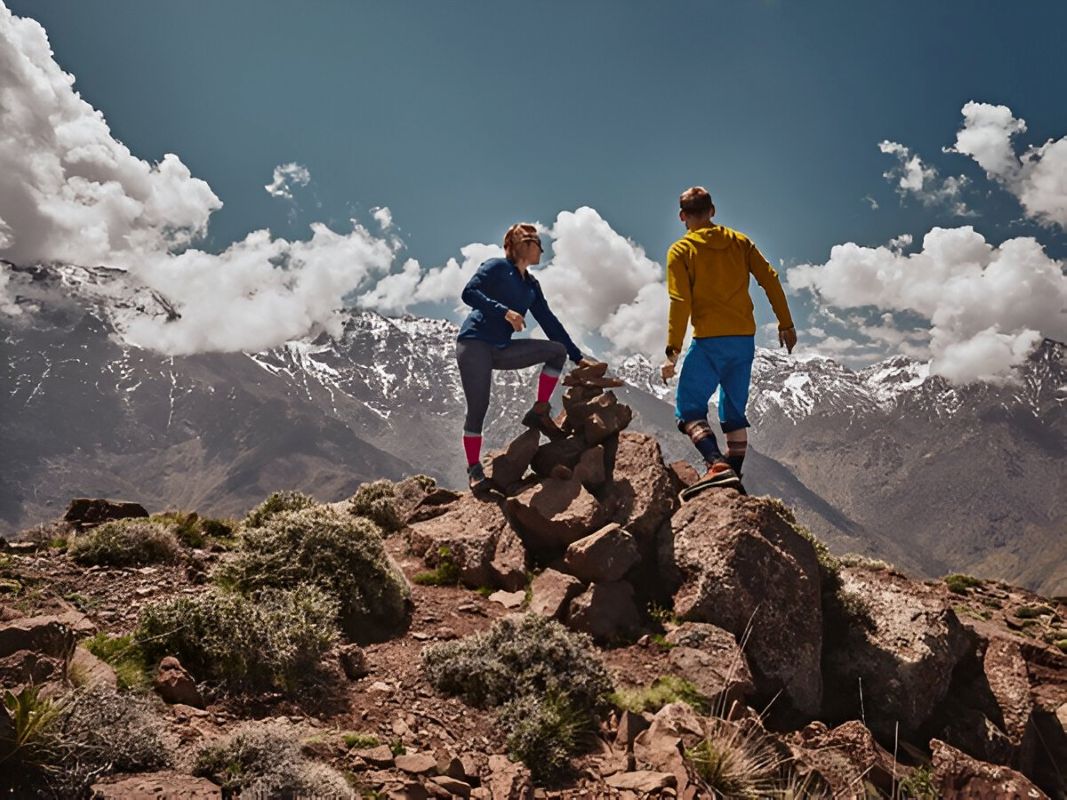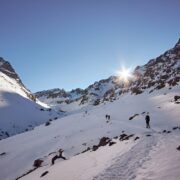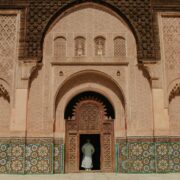
Exploring the Majestic Atlas Mountains: A Guide to North Africa’s Natural Wonder
The Atlas Mountains are a breathtaking natural wonder. They offer rugged landscapes, rich cultural heritage, and exciting outdoor activities in North Africa. The Atlas Mountains stretch across Morocco, Algeria, and Tunisia, covering over 2,500 kilometers.
Located in the heart of North Africa, the Atlas Mountains are a major mountain range. They offer a diverse range of experiences. From hiking and trekking to exploring Berber villages and enjoying local cuisine, all set against the stunning backdrop of the Atlas Mountains in North Africa.
In this guide, we will explore the majesty of the Atlas Mountains. We will look at their geographical location and extent, historical significance, natural beauty, and cultural heritage. We will highlight what makes the Atlas Mountains mountain ranges in North Africa so unique.
Key Takeaways
- The Atlas Mountains are the largest mountain range in North Africa, stretching across Morocco, Algeria, and Tunisia.
- The Atlas Mountains offer a unique blend of rugged landscapes, rich cultural heritage, and exciting outdoor activities.
- The mountain range covers a vast area of over 2,500 kilometers in the Atlas Mountains mountain ranges.
- The Atlas Mountains are home to a diverse range of flora and fauna, as well as Berber villages and local communities.
- The best time to visit the Atlas Mountains depends on the season and activities, such as hiking and trekking in the Atlas Mountains mountain ranges.
- The Atlas Mountains are a popular destination for outdoor enthusiasts, with many hiking trails and trekking routes to explore in North Africa.
Introduction to the Atlas Mountains
The Atlas Mountains are a stunning range in North Africa’s Maghreb region. They cover over 2,500 kilometers, stretching from Morocco to Tunisia. The highest peak, Jbel Toubkal in Morocco, reaches 4,167 meters.
In terms of geographical location, the Atlas Mountains are a key feature in North Africa. They are influenced by both the Mediterranean and Atlantic.
The Atlas Mountains have a deep historical significance. Humans have lived here since the Paleolithic era. The Berbers, Romans, and Arabs have all left their mark on the area.
Some highlights of the Atlas Mountains include:
- Mountain peaks, such as Jbel Toubkal, which offer breathtaking views and challenging hiking trails
- Traditional Berber villages, with their unique architecture and cultural practices
- Historical sites, such as ancient Roman ruins and Arab fortresses
The Atlas Mountains are a top spot for hiking and trekking. They are also rich in culture and history. With their unique geographical location, historical significance, and stunning mountain peaks, they are a must-see for anyone exploring North Africa.
The Natural Beauty of North Africa’s Greatest Mountain Range
The Atlas Mountains are a paradise for nature lovers. They offer a variety of outdoor activities and stunning mountain landscapes. From the High Atlas’s snow-capped peaks to the Middle Atlas’s lush valleys, the area is full of life.
Visitors can hike, trek, and ski in the winter. Or, they can explore villages and towns, each with its own culture and traditions.
The natural beauty of the Atlas Mountains is unmatched. It boasts rugged peaks, sparkling waterfalls, and beautiful valleys. The region has several national parks, like Toubkal National Park and Haut Atlas Oriental National Park.
These parks are great for hiking, camping, and wildlife watching.
Some popular outdoor activities in the Atlas Mountains include:
- Hiking and trekking
- Skiing and snowboarding
- Rock climbing and mountaineering
- Wildlife watching and birdwatching
The Atlas Mountains are a must-see for those who love natural beauty and outdoor activities. With its unique culture, rich history, and stunning mountain landscapes, it has something for every traveler.
Climate and Seasonal Changes in the Atlas Region
The Atlas Mountains have a Mediterranean climate. This means warm summers and cold winters. These changes attract visitors from all over.
The region’s diverse landscape supports many outdoor activities. You can hike, trek, and enjoy winter sports here.
In summer, the Atlas Mountains are a cool escape from the heat. The mild temperatures and scenic trails are perfect for hiking. On the other hand, winter brings snow and ice, great for winter sports.
The Oukaimeden ski resort in Morocco is a top spot for skiing and snowboarding.
Summer Conditions and Activities
- Hiking and trekking through scenic trails
- Exploring traditional Berber villages
- Enjoying local cuisine and hospitality
Winter Adventures and Snow Sports
- Skiing and snowboarding at Oukaimeden ski resort
- Ice climbing and snowshoeing
- Exploring snow-covered landscapes and villages
The climate and seasonal changes in the Atlas Mountains offer a unique experience. Whether you love summer’s warmth or the excitement of winter sports, there’s something for everyone.
Flora and Fauna of the Atlas Mountains
The Atlas Mountains are a treasure trove of flora and fauna. They boast a rich biodiversity unlike anywhere else. The mountains are covered in cedar, pine, oak, and olive trees.
Notable species include the Barbary macaque and the Atlas deer. These animals are key to the region’s biodiversity. Their presence shows the area’s rich fauna.
Visitors can explore national parks like Toubkal and Haut Atlas Oriental. These parks offer hiking and trekking. They’re a chance to see the diverse biodiversity up close.
The Atlas Mountains are a paradise for nature lovers and outdoor fans. Their unique flora and fauna make them a top spot for exploring North Africa’s natural wonders.
Cultural Heritage and Local Communities
The Atlas Mountains are home to a rich cultural heritage. The Berber people, the indigenous inhabitants, have a unique culture and traditions. Each village has its own distinct character. Visitors can experience the warm hospitality of the Berber people, known for their welcoming nature and rich cultural traditions.
The region is dotted with Berber villages, each with its own unique culture and customs. The local cuisine is a highlight, with dishes like tagines, couscous, and pastilla. The local cuisine reflects the Berber people’s traditional cooking methods and ingredients, making it a must-try for any visitor.
- Traditional music and dance
- Unique crafts and textiles
- Delicious local cuisine
The Berber people are skilled farmers, with agricultural practices adapted to the region’s climate and soil. The Atlas Mountains offer a unique and enriching cultural experience. The Berber people’s richcultural heritage is a major highlight of the region.
Planning Your Atlas Mountains Adventure
Planning a trip to the Atlas Mountains requires some key considerations. Accommodation choices range from affordable guesthouses to high-end hotels and riads. It’s wise to book ahead to avoid crowds.
For transportation, you can pick from buses, taxis, or rental cars. This ensures a smooth journey to your destination.
Outdoor enthusiasts need the right gear for their activities. This includes hiking boots, trekking poles, and warm clothes. Hiring guides and porters can also be helpful for exploring the area’s trails.
Here are some planning tips:
- Book your stay and transport early to dodge the crowds.
- Don’t forget to pack the necessary gear, like hiking boots and warm clothes.
- Consider hiring guides and porters for easier navigation of the trails.
With proper planning, your Atlas Mountains trip will be safe and fun. This region offers breathtaking views and a rich cultural heritage, making it a top spot for travelers.
Popular Hiking Trails and Trekking Routes
The Atlas Mountains are a paradise for outdoor lovers. They offer trails for all, from easy day hikes to long treks. You can explore valleys and gorges like the Ourika Valley and Dades Gorge. The Toubkal Circuit is famous for reaching the highest peak, offering amazing views.
Hiking enthusiasts will find plenty to love in the Atlas Mountains. The M’Goun Massif is another top choice, with incredible views. Here are some of the best trails and routes:
- Toubkal Circuit: a multi-day trek to the highest peak in the Atlas Mountains
- M’Goun Massif: a trekking route offering stunning views of the surrounding landscape
- Ourika Valley: a scenic valley with easy day hikes and stunning views
- Dades Gorge: a gorge with stunning rock formations and scenic hiking trails
These trails and routes provide a variety of outdoor activities. You can hike, trek, climb, and explore. The Atlas Mountains’ unique landscape and diverse wildlife make it a top spot for nature lovers.
Safety and Travel Considerations
When you travel to the Atlas Mountains, safety is key. You need to be ready for the weather, like snow and ice in winter. Make sure you have warm clothes and the right gear.
It’s important to stay healthy too. Drink lots of water, eat well, and rest often. This helps your body adjust to the high altitude. Also, know about altitude sickness and how to avoid it.
Here are some tips for a safe trip to the Atlas Mountains:
- Follow local rules to protect the environment and communities.
- Keep up with the weather and watch out for dangers like landslides.
- Don’t forget your medicines and first aid kit.
By following these tips, you can have a safe and fun trip. You’ll also help keep the Atlas Mountains healthy and safe for everyone.
Conclusion: Embracing the Majesty of North Africa’s Natural Wonder
The Atlas Mountains in North Africa are truly a wonder. They offer a captivating experience for all. From the High Atlas’s snow-capped peaks to the Middle Atlas’s lush valleys, they are a paradise for outdoor lovers and culture seekers.
Looking for adventure or a peaceful escape? The Atlas Mountains have it all. Dive into the Berber culture, enjoy the local food, and see the stunning views that have inspired many. This place will surely leave a mark on your heart.
Ready for an unforgettable trip? Pack your bags and get your hiking boots ready. The Atlas Mountains await, offering a chance to step away from today’s world and connect with nature’s timeless beauty.
FAQ
What is the geographical location and extent of the Atlas Mountains?
The Atlas Mountains are in North Africa’s Maghreb region. They stretch over 2,500 kilometers. The highest peak, Jbel Toubkal in Morocco, reaches 4,167 meters.
What is the historical significance of the Atlas Mountains?
The Atlas Mountains have a long history. Humans lived here since the Paleolithic era. Many cultures, like the Berbers, Romans, and Arabs, have shaped the area.
What outdoor activities can visitors enjoy in the Atlas Mountains?
Visitors can hike, trek, and ski in the Atlas Mountains. There are many national parks to explore. These parks showcase the area’s biodiversity and beauty.
What is the climate and seasonal changes in the Atlas region?
The Atlas Mountains have a Mediterranean climate. Summers are warm, winters are cold. Spring and autumn are the best times to visit, with mild weather.
What is the cultural heritage and local communities of the Atlas Mountains?
The Berber people live in the Atlas Mountains. They have a rich culture and traditions. Visitors can experience their hospitality and learn about their customs.
What should visitors consider when planning a trip to the Atlas Mountains?
Plan ahead for your trip. Book your stay and transport early. Bring the right gear for outdoor activities. Be aware of the weather and altitude.
What are some of the popular hiking trails and trekking routes in the Atlas Mountains?
The Atlas Mountains have many trails. The Toubkal Circuit reaches the highest peak. The M’Goun Massif offers beautiful views. Explore valleys like the Ourika Valley and Dades Gorge.
What safety and travel considerations should visitors be aware of in the Atlas Mountains?
Be cautious of the weather, especially snow and ice in winter. Wear warm clothes and consider a guide. Altitude sickness is a risk. Respect local customs and the environment.
Recent Posts
Trekking And Tours in Morocco
Exploring the Majestic Atlas Mountains: A Guide to North Africa’s Natural Wonder
Things to See and Do When Visiting Morocco
All Categories

Thailand




